Family and Child Nursing Case Studies: Ethical and Legal Aspects
VerifiedAdded on 2022/08/13
|9
|2324
|23
Report
AI Summary
This report presents an analysis of three case studies in family and child nursing, exploring various ethical and legal considerations. The first case involves a family with concerns about vaccinations and autism, addressing issues of informed consent, parental misconceptions, and the nurse's role in providing evidence-based information and promoting child health. The second case examines an adolescent's concerns about sexual health, discussing the importance of autonomy, confidentiality, and the nurse's role in providing support and guidance, while navigating legal constraints related to minors. The third case focuses on a child experiencing emotional trauma due to domestic abuse, highlighting the importance of trauma-informed care, family counseling, and interdisciplinary collaboration to address the child's needs and promote family well-being. The report emphasizes the application of ethical principles, relevant legislation, and effective nursing interventions to ensure holistic, family-centered care in each scenario.
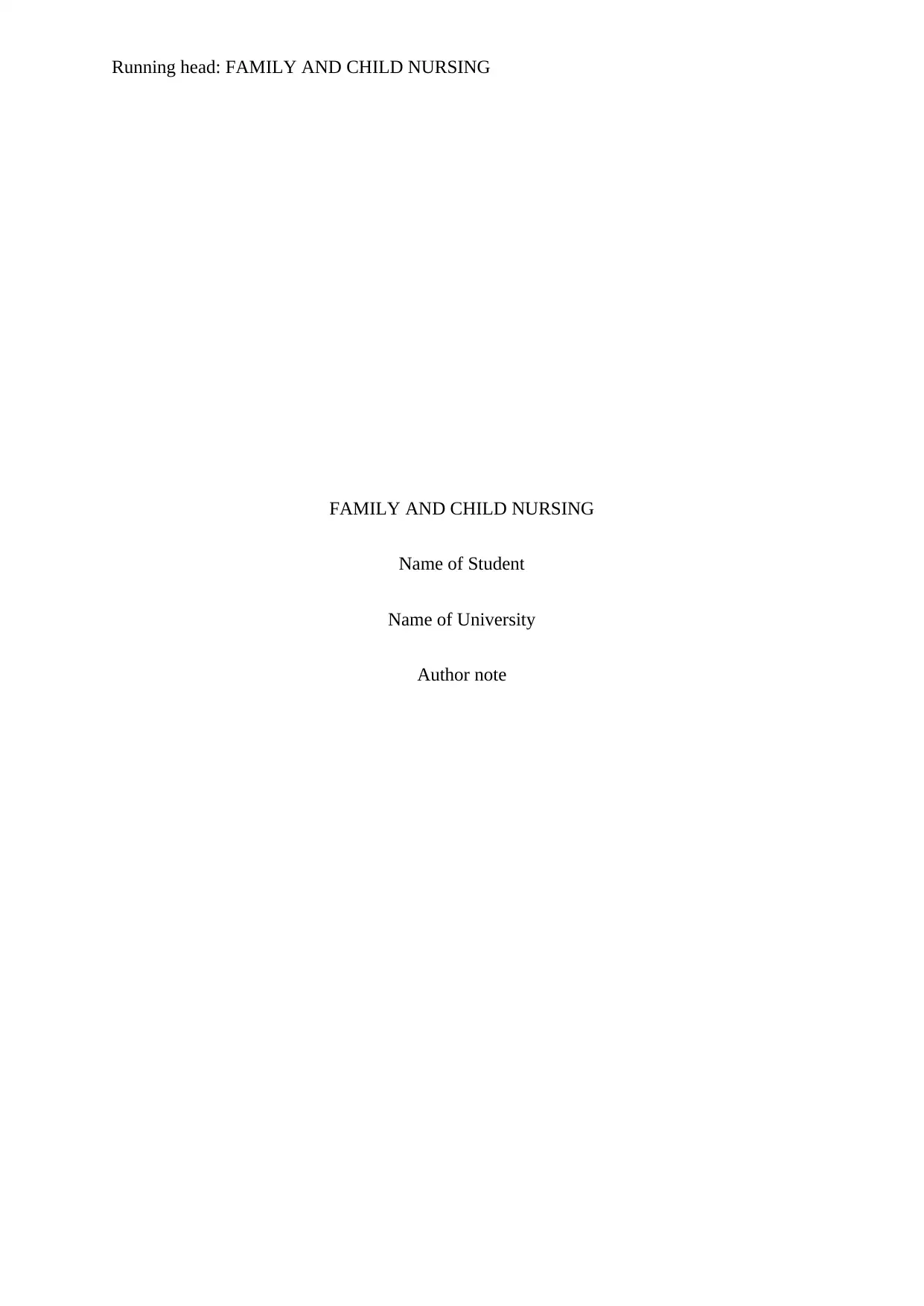
Running head: FAMILY AND CHILD NURSING
FAMILY AND CHILD NURSING
Name of Student
Name of University
Author note
FAMILY AND CHILD NURSING
Name of Student
Name of University
Author note
Paraphrase This Document
Need a fresh take? Get an instant paraphrase of this document with our AI Paraphraser
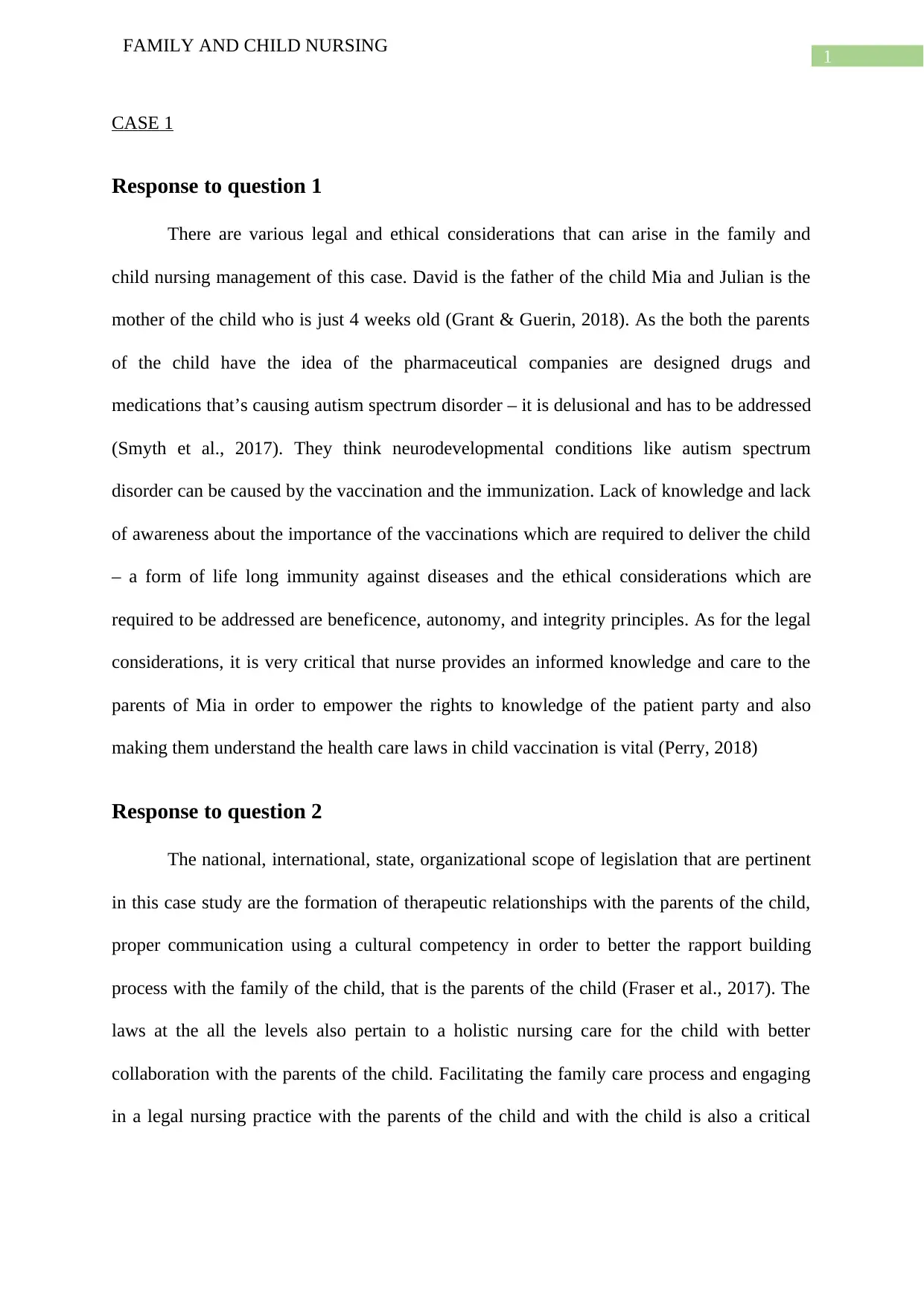
1
FAMILY AND CHILD NURSING
CASE 1
Response to question 1
There are various legal and ethical considerations that can arise in the family and
child nursing management of this case. David is the father of the child Mia and Julian is the
mother of the child who is just 4 weeks old (Grant & Guerin, 2018). As the both the parents
of the child have the idea of the pharmaceutical companies are designed drugs and
medications that’s causing autism spectrum disorder – it is delusional and has to be addressed
(Smyth et al., 2017). They think neurodevelopmental conditions like autism spectrum
disorder can be caused by the vaccination and the immunization. Lack of knowledge and lack
of awareness about the importance of the vaccinations which are required to deliver the child
– a form of life long immunity against diseases and the ethical considerations which are
required to be addressed are beneficence, autonomy, and integrity principles. As for the legal
considerations, it is very critical that nurse provides an informed knowledge and care to the
parents of Mia in order to empower the rights to knowledge of the patient party and also
making them understand the health care laws in child vaccination is vital (Perry, 2018)
Response to question 2
The national, international, state, organizational scope of legislation that are pertinent
in this case study are the formation of therapeutic relationships with the parents of the child,
proper communication using a cultural competency in order to better the rapport building
process with the family of the child, that is the parents of the child (Fraser et al., 2017). The
laws at the all the levels also pertain to a holistic nursing care for the child with better
collaboration with the parents of the child. Facilitating the family care process and engaging
in a legal nursing practice with the parents of the child and with the child is also a critical
FAMILY AND CHILD NURSING
CASE 1
Response to question 1
There are various legal and ethical considerations that can arise in the family and
child nursing management of this case. David is the father of the child Mia and Julian is the
mother of the child who is just 4 weeks old (Grant & Guerin, 2018). As the both the parents
of the child have the idea of the pharmaceutical companies are designed drugs and
medications that’s causing autism spectrum disorder – it is delusional and has to be addressed
(Smyth et al., 2017). They think neurodevelopmental conditions like autism spectrum
disorder can be caused by the vaccination and the immunization. Lack of knowledge and lack
of awareness about the importance of the vaccinations which are required to deliver the child
– a form of life long immunity against diseases and the ethical considerations which are
required to be addressed are beneficence, autonomy, and integrity principles. As for the legal
considerations, it is very critical that nurse provides an informed knowledge and care to the
parents of Mia in order to empower the rights to knowledge of the patient party and also
making them understand the health care laws in child vaccination is vital (Perry, 2018)
Response to question 2
The national, international, state, organizational scope of legislation that are pertinent
in this case study are the formation of therapeutic relationships with the parents of the child,
proper communication using a cultural competency in order to better the rapport building
process with the family of the child, that is the parents of the child (Fraser et al., 2017). The
laws at the all the levels also pertain to a holistic nursing care for the child with better
collaboration with the parents of the child. Facilitating the family care process and engaging
in a legal nursing practice with the parents of the child and with the child is also a critical
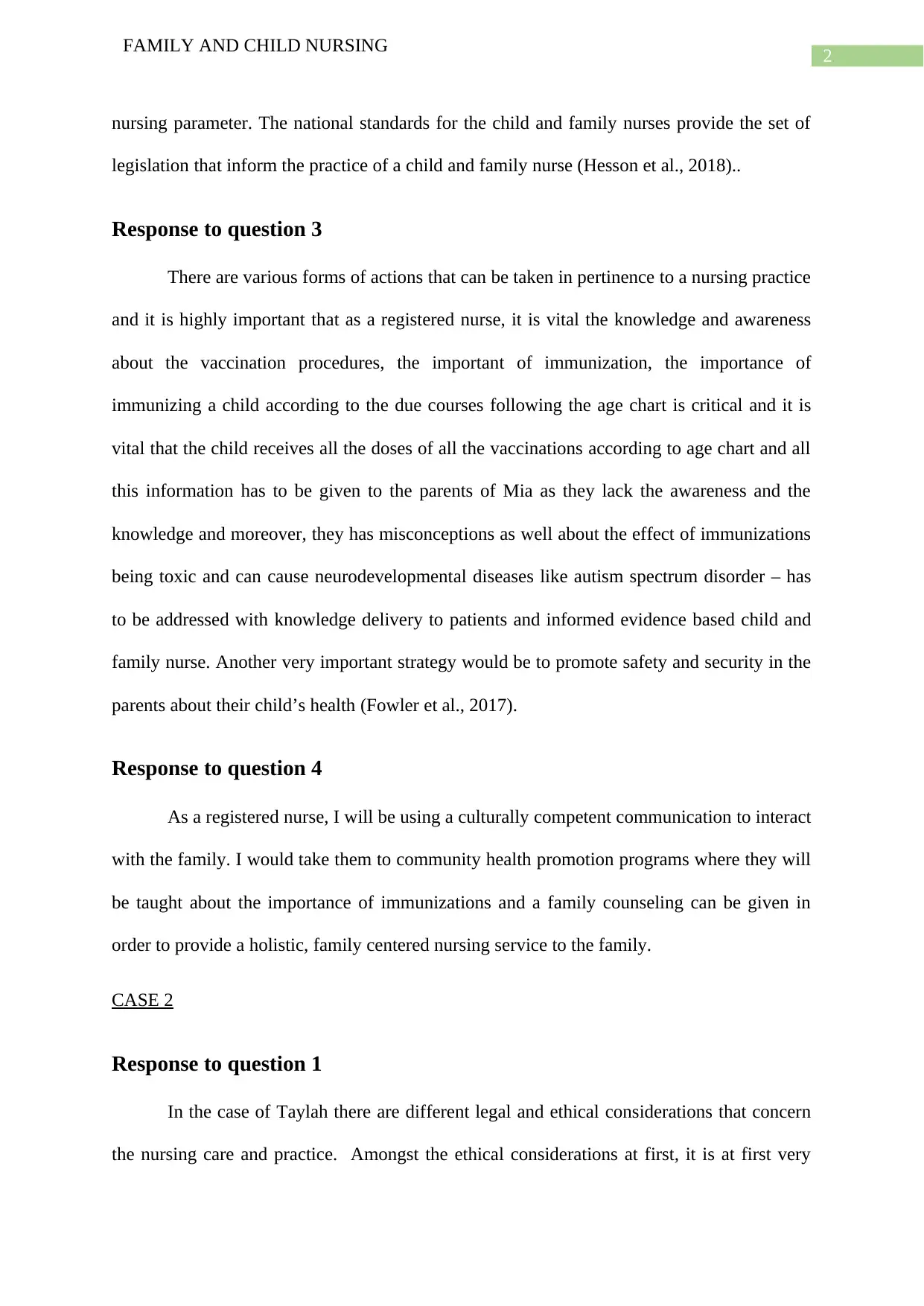
2
FAMILY AND CHILD NURSING
nursing parameter. The national standards for the child and family nurses provide the set of
legislation that inform the practice of a child and family nurse (Hesson et al., 2018)..
Response to question 3
There are various forms of actions that can be taken in pertinence to a nursing practice
and it is highly important that as a registered nurse, it is vital the knowledge and awareness
about the vaccination procedures, the important of immunization, the importance of
immunizing a child according to the due courses following the age chart is critical and it is
vital that the child receives all the doses of all the vaccinations according to age chart and all
this information has to be given to the parents of Mia as they lack the awareness and the
knowledge and moreover, they has misconceptions as well about the effect of immunizations
being toxic and can cause neurodevelopmental diseases like autism spectrum disorder – has
to be addressed with knowledge delivery to patients and informed evidence based child and
family nurse. Another very important strategy would be to promote safety and security in the
parents about their child’s health (Fowler et al., 2017).
Response to question 4
As a registered nurse, I will be using a culturally competent communication to interact
with the family. I would take them to community health promotion programs where they will
be taught about the importance of immunizations and a family counseling can be given in
order to provide a holistic, family centered nursing service to the family.
CASE 2
Response to question 1
In the case of Taylah there are different legal and ethical considerations that concern
the nursing care and practice. Amongst the ethical considerations at first, it is at first very
FAMILY AND CHILD NURSING
nursing parameter. The national standards for the child and family nurses provide the set of
legislation that inform the practice of a child and family nurse (Hesson et al., 2018)..
Response to question 3
There are various forms of actions that can be taken in pertinence to a nursing practice
and it is highly important that as a registered nurse, it is vital the knowledge and awareness
about the vaccination procedures, the important of immunization, the importance of
immunizing a child according to the due courses following the age chart is critical and it is
vital that the child receives all the doses of all the vaccinations according to age chart and all
this information has to be given to the parents of Mia as they lack the awareness and the
knowledge and moreover, they has misconceptions as well about the effect of immunizations
being toxic and can cause neurodevelopmental diseases like autism spectrum disorder – has
to be addressed with knowledge delivery to patients and informed evidence based child and
family nurse. Another very important strategy would be to promote safety and security in the
parents about their child’s health (Fowler et al., 2017).
Response to question 4
As a registered nurse, I will be using a culturally competent communication to interact
with the family. I would take them to community health promotion programs where they will
be taught about the importance of immunizations and a family counseling can be given in
order to provide a holistic, family centered nursing service to the family.
CASE 2
Response to question 1
In the case of Taylah there are different legal and ethical considerations that concern
the nursing care and practice. Amongst the ethical considerations at first, it is at first very
⊘ This is a preview!⊘
Do you want full access?
Subscribe today to unlock all pages.

Trusted by 1+ million students worldwide
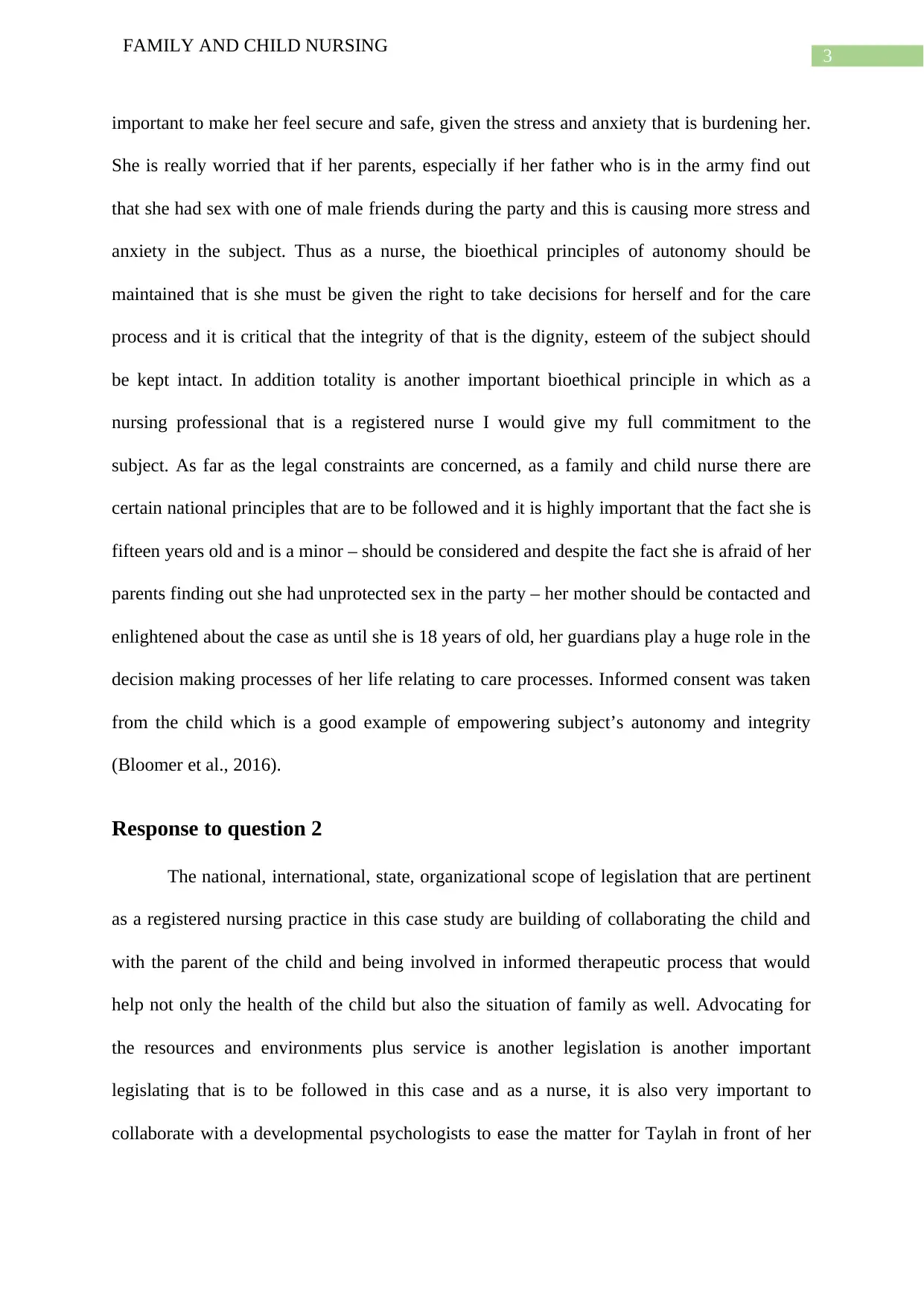
3
FAMILY AND CHILD NURSING
important to make her feel secure and safe, given the stress and anxiety that is burdening her.
She is really worried that if her parents, especially if her father who is in the army find out
that she had sex with one of male friends during the party and this is causing more stress and
anxiety in the subject. Thus as a nurse, the bioethical principles of autonomy should be
maintained that is she must be given the right to take decisions for herself and for the care
process and it is critical that the integrity of that is the dignity, esteem of the subject should
be kept intact. In addition totality is another important bioethical principle in which as a
nursing professional that is a registered nurse I would give my full commitment to the
subject. As far as the legal constraints are concerned, as a family and child nurse there are
certain national principles that are to be followed and it is highly important that the fact she is
fifteen years old and is a minor – should be considered and despite the fact she is afraid of her
parents finding out she had unprotected sex in the party – her mother should be contacted and
enlightened about the case as until she is 18 years of old, her guardians play a huge role in the
decision making processes of her life relating to care processes. Informed consent was taken
from the child which is a good example of empowering subject’s autonomy and integrity
(Bloomer et al., 2016).
Response to question 2
The national, international, state, organizational scope of legislation that are pertinent
as a registered nursing practice in this case study are building of collaborating the child and
with the parent of the child and being involved in informed therapeutic process that would
help not only the health of the child but also the situation of family as well. Advocating for
the resources and environments plus service is another legislation is another important
legislating that is to be followed in this case and as a nurse, it is also very important to
collaborate with a developmental psychologists to ease the matter for Taylah in front of her
FAMILY AND CHILD NURSING
important to make her feel secure and safe, given the stress and anxiety that is burdening her.
She is really worried that if her parents, especially if her father who is in the army find out
that she had sex with one of male friends during the party and this is causing more stress and
anxiety in the subject. Thus as a nurse, the bioethical principles of autonomy should be
maintained that is she must be given the right to take decisions for herself and for the care
process and it is critical that the integrity of that is the dignity, esteem of the subject should
be kept intact. In addition totality is another important bioethical principle in which as a
nursing professional that is a registered nurse I would give my full commitment to the
subject. As far as the legal constraints are concerned, as a family and child nurse there are
certain national principles that are to be followed and it is highly important that the fact she is
fifteen years old and is a minor – should be considered and despite the fact she is afraid of her
parents finding out she had unprotected sex in the party – her mother should be contacted and
enlightened about the case as until she is 18 years of old, her guardians play a huge role in the
decision making processes of her life relating to care processes. Informed consent was taken
from the child which is a good example of empowering subject’s autonomy and integrity
(Bloomer et al., 2016).
Response to question 2
The national, international, state, organizational scope of legislation that are pertinent
as a registered nursing practice in this case study are building of collaborating the child and
with the parent of the child and being involved in informed therapeutic process that would
help not only the health of the child but also the situation of family as well. Advocating for
the resources and environments plus service is another legislation is another important
legislating that is to be followed in this case and as a nurse, it is also very important to
collaborate with a developmental psychologists to ease the matter for Taylah in front of her
Paraphrase This Document
Need a fresh take? Get an instant paraphrase of this document with our AI Paraphraser
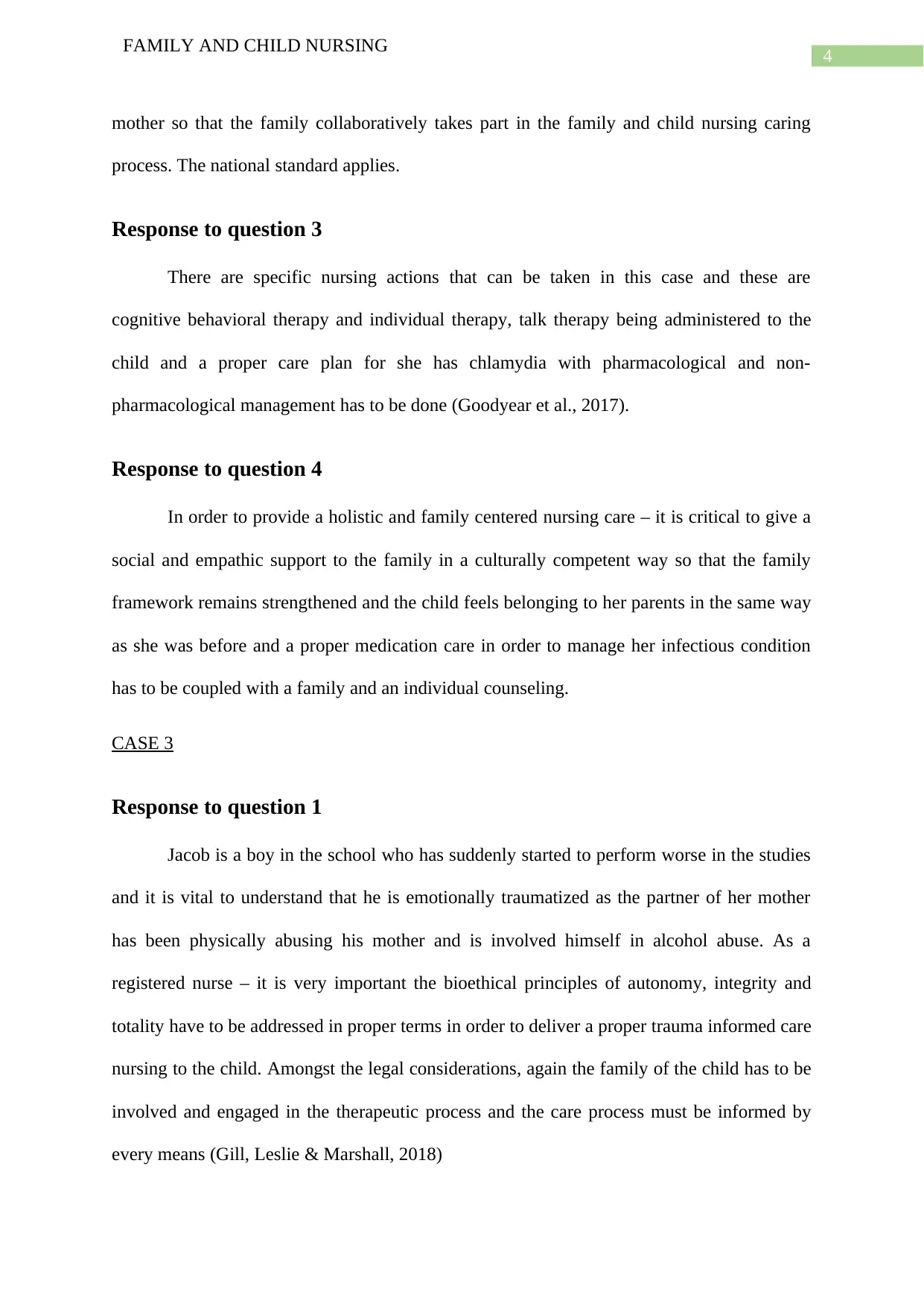
4
FAMILY AND CHILD NURSING
mother so that the family collaboratively takes part in the family and child nursing caring
process. The national standard applies.
Response to question 3
There are specific nursing actions that can be taken in this case and these are
cognitive behavioral therapy and individual therapy, talk therapy being administered to the
child and a proper care plan for she has chlamydia with pharmacological and non-
pharmacological management has to be done (Goodyear et al., 2017).
Response to question 4
In order to provide a holistic and family centered nursing care – it is critical to give a
social and empathic support to the family in a culturally competent way so that the family
framework remains strengthened and the child feels belonging to her parents in the same way
as she was before and a proper medication care in order to manage her infectious condition
has to be coupled with a family and an individual counseling.
CASE 3
Response to question 1
Jacob is a boy in the school who has suddenly started to perform worse in the studies
and it is vital to understand that he is emotionally traumatized as the partner of her mother
has been physically abusing his mother and is involved himself in alcohol abuse. As a
registered nurse – it is very important the bioethical principles of autonomy, integrity and
totality have to be addressed in proper terms in order to deliver a proper trauma informed care
nursing to the child. Amongst the legal considerations, again the family of the child has to be
involved and engaged in the therapeutic process and the care process must be informed by
every means (Gill, Leslie & Marshall, 2018)
FAMILY AND CHILD NURSING
mother so that the family collaboratively takes part in the family and child nursing caring
process. The national standard applies.
Response to question 3
There are specific nursing actions that can be taken in this case and these are
cognitive behavioral therapy and individual therapy, talk therapy being administered to the
child and a proper care plan for she has chlamydia with pharmacological and non-
pharmacological management has to be done (Goodyear et al., 2017).
Response to question 4
In order to provide a holistic and family centered nursing care – it is critical to give a
social and empathic support to the family in a culturally competent way so that the family
framework remains strengthened and the child feels belonging to her parents in the same way
as she was before and a proper medication care in order to manage her infectious condition
has to be coupled with a family and an individual counseling.
CASE 3
Response to question 1
Jacob is a boy in the school who has suddenly started to perform worse in the studies
and it is vital to understand that he is emotionally traumatized as the partner of her mother
has been physically abusing his mother and is involved himself in alcohol abuse. As a
registered nurse – it is very important the bioethical principles of autonomy, integrity and
totality have to be addressed in proper terms in order to deliver a proper trauma informed care
nursing to the child. Amongst the legal considerations, again the family of the child has to be
involved and engaged in the therapeutic process and the care process must be informed by
every means (Gill, Leslie & Marshall, 2018)
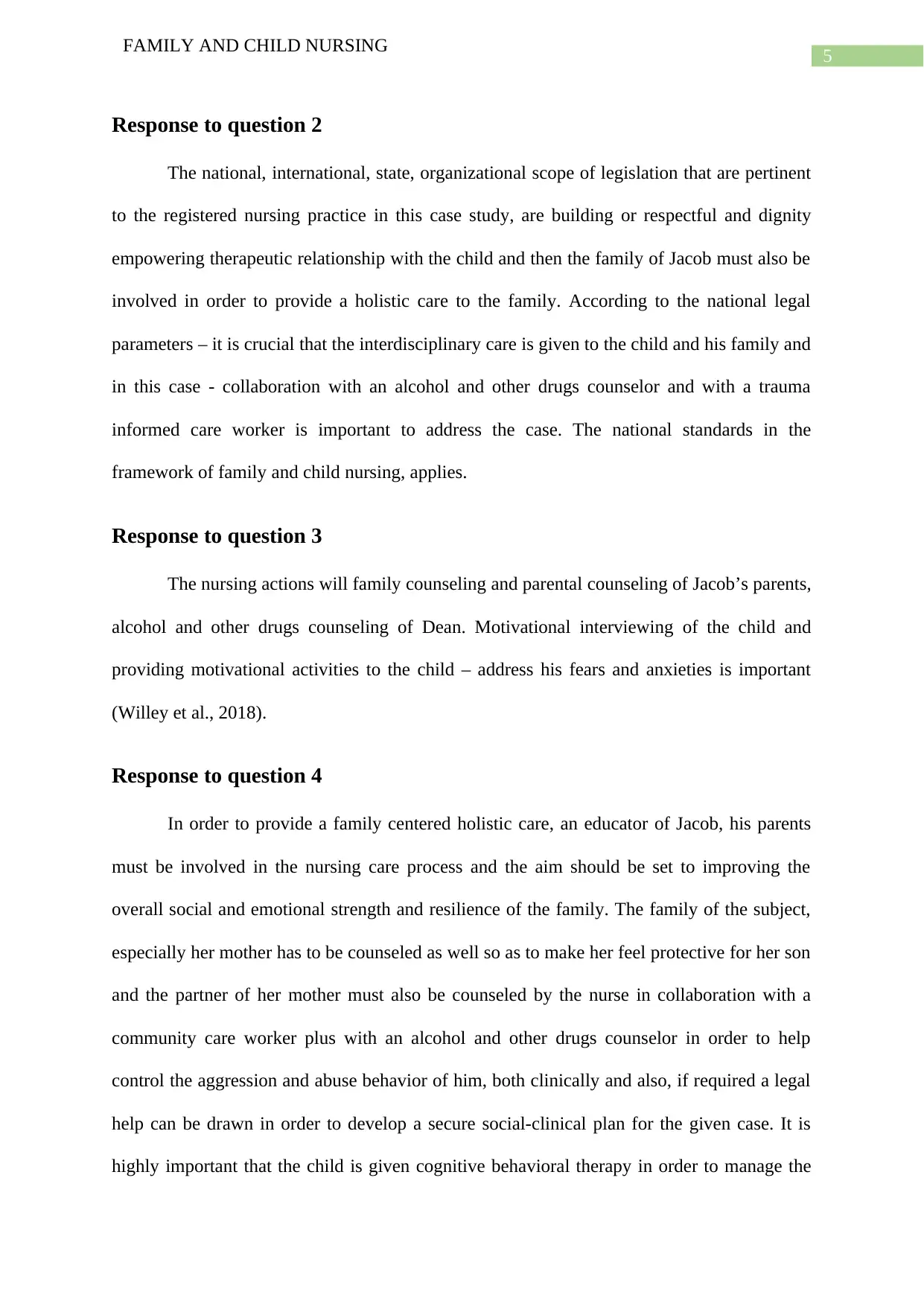
5
FAMILY AND CHILD NURSING
Response to question 2
The national, international, state, organizational scope of legislation that are pertinent
to the registered nursing practice in this case study, are building or respectful and dignity
empowering therapeutic relationship with the child and then the family of Jacob must also be
involved in order to provide a holistic care to the family. According to the national legal
parameters – it is crucial that the interdisciplinary care is given to the child and his family and
in this case - collaboration with an alcohol and other drugs counselor and with a trauma
informed care worker is important to address the case. The national standards in the
framework of family and child nursing, applies.
Response to question 3
The nursing actions will family counseling and parental counseling of Jacob’s parents,
alcohol and other drugs counseling of Dean. Motivational interviewing of the child and
providing motivational activities to the child – address his fears and anxieties is important
(Willey et al., 2018).
Response to question 4
In order to provide a family centered holistic care, an educator of Jacob, his parents
must be involved in the nursing care process and the aim should be set to improving the
overall social and emotional strength and resilience of the family. The family of the subject,
especially her mother has to be counseled as well so as to make her feel protective for her son
and the partner of her mother must also be counseled by the nurse in collaboration with a
community care worker plus with an alcohol and other drugs counselor in order to help
control the aggression and abuse behavior of him, both clinically and also, if required a legal
help can be drawn in order to develop a secure social-clinical plan for the given case. It is
highly important that the child is given cognitive behavioral therapy in order to manage the
FAMILY AND CHILD NURSING
Response to question 2
The national, international, state, organizational scope of legislation that are pertinent
to the registered nursing practice in this case study, are building or respectful and dignity
empowering therapeutic relationship with the child and then the family of Jacob must also be
involved in order to provide a holistic care to the family. According to the national legal
parameters – it is crucial that the interdisciplinary care is given to the child and his family and
in this case - collaboration with an alcohol and other drugs counselor and with a trauma
informed care worker is important to address the case. The national standards in the
framework of family and child nursing, applies.
Response to question 3
The nursing actions will family counseling and parental counseling of Jacob’s parents,
alcohol and other drugs counseling of Dean. Motivational interviewing of the child and
providing motivational activities to the child – address his fears and anxieties is important
(Willey et al., 2018).
Response to question 4
In order to provide a family centered holistic care, an educator of Jacob, his parents
must be involved in the nursing care process and the aim should be set to improving the
overall social and emotional strength and resilience of the family. The family of the subject,
especially her mother has to be counseled as well so as to make her feel protective for her son
and the partner of her mother must also be counseled by the nurse in collaboration with a
community care worker plus with an alcohol and other drugs counselor in order to help
control the aggression and abuse behavior of him, both clinically and also, if required a legal
help can be drawn in order to develop a secure social-clinical plan for the given case. It is
highly important that the child is given cognitive behavioral therapy in order to manage the
⊘ This is a preview!⊘
Do you want full access?
Subscribe today to unlock all pages.

Trusted by 1+ million students worldwide
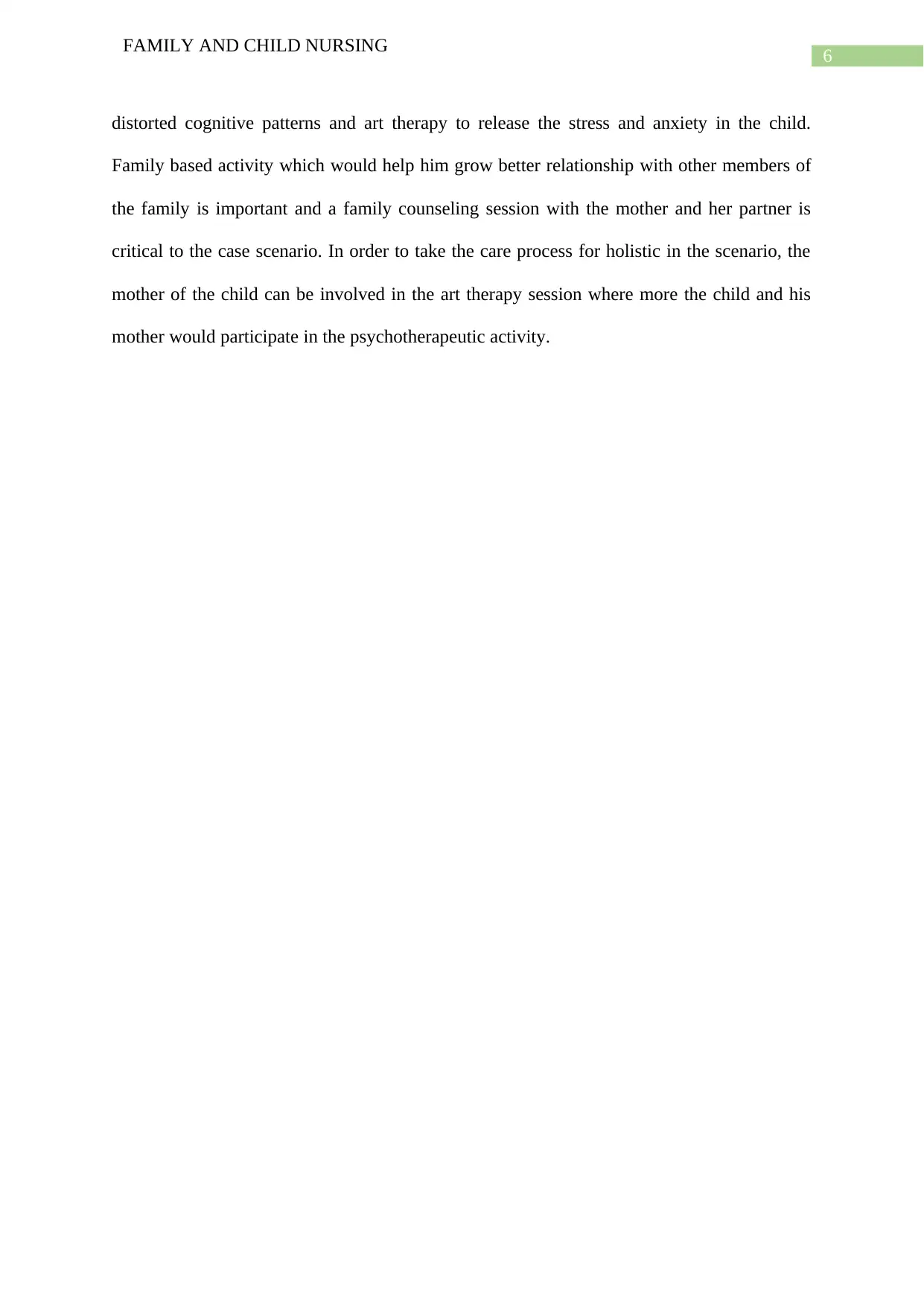
6
FAMILY AND CHILD NURSING
distorted cognitive patterns and art therapy to release the stress and anxiety in the child.
Family based activity which would help him grow better relationship with other members of
the family is important and a family counseling session with the mother and her partner is
critical to the case scenario. In order to take the care process for holistic in the scenario, the
mother of the child can be involved in the art therapy session where more the child and his
mother would participate in the psychotherapeutic activity.
FAMILY AND CHILD NURSING
distorted cognitive patterns and art therapy to release the stress and anxiety in the child.
Family based activity which would help him grow better relationship with other members of
the family is important and a family counseling session with the mother and her partner is
critical to the case scenario. In order to take the care process for holistic in the scenario, the
mother of the child can be involved in the art therapy session where more the child and his
mother would participate in the psychotherapeutic activity.
Paraphrase This Document
Need a fresh take? Get an instant paraphrase of this document with our AI Paraphraser
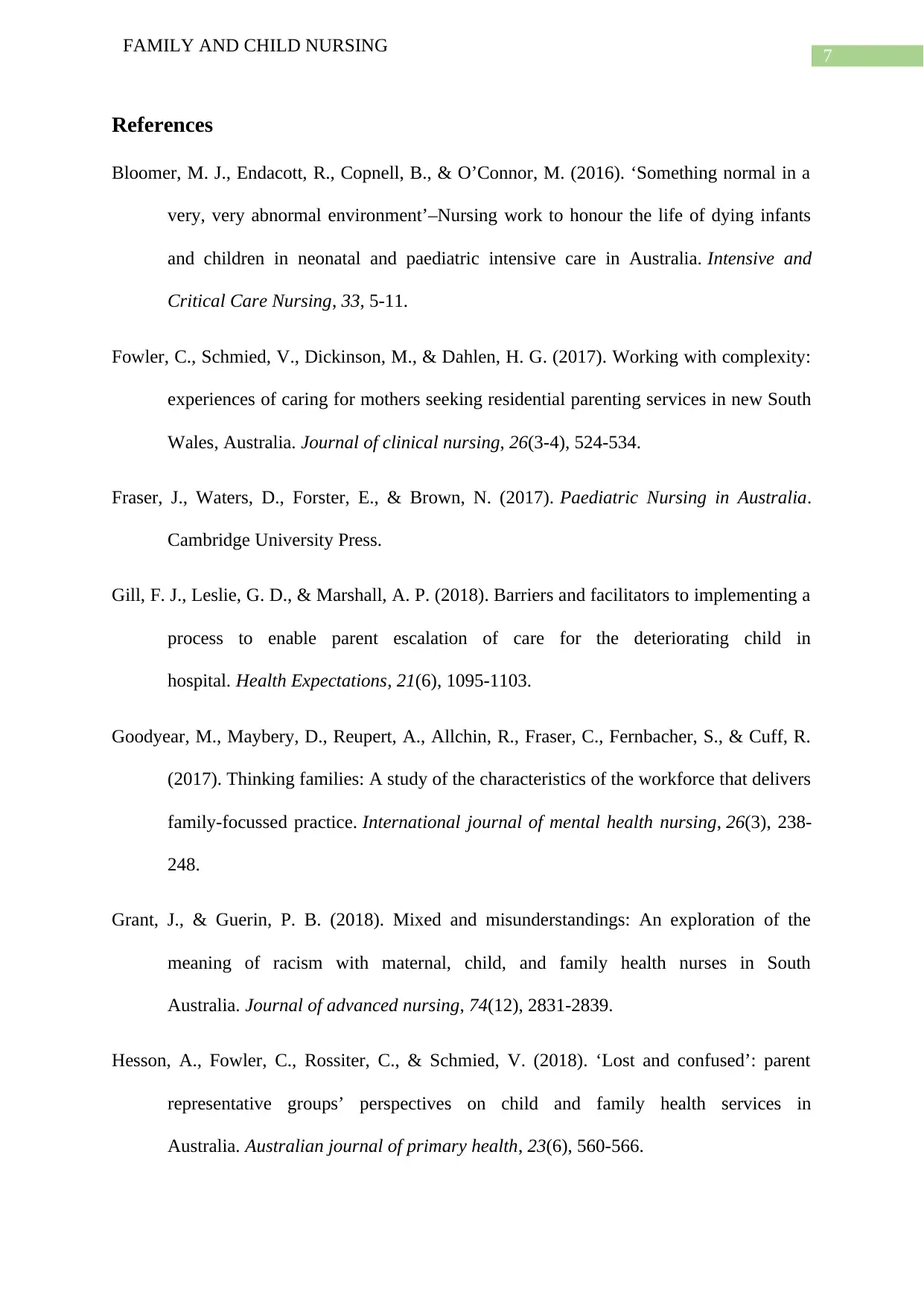
7
FAMILY AND CHILD NURSING
References
Bloomer, M. J., Endacott, R., Copnell, B., & O’Connor, M. (2016). ‘Something normal in a
very, very abnormal environment’–Nursing work to honour the life of dying infants
and children in neonatal and paediatric intensive care in Australia. Intensive and
Critical Care Nursing, 33, 5-11.
Fowler, C., Schmied, V., Dickinson, M., & Dahlen, H. G. (2017). Working with complexity:
experiences of caring for mothers seeking residential parenting services in new South
Wales, Australia. Journal of clinical nursing, 26(3-4), 524-534.
Fraser, J., Waters, D., Forster, E., & Brown, N. (2017). Paediatric Nursing in Australia.
Cambridge University Press.
Gill, F. J., Leslie, G. D., & Marshall, A. P. (2018). Barriers and facilitators to implementing a
process to enable parent escalation of care for the deteriorating child in
hospital. Health Expectations, 21(6), 1095-1103.
Goodyear, M., Maybery, D., Reupert, A., Allchin, R., Fraser, C., Fernbacher, S., & Cuff, R.
(2017). Thinking families: A study of the characteristics of the workforce that delivers
family‐focussed practice. International journal of mental health nursing, 26(3), 238-
248.
Grant, J., & Guerin, P. B. (2018). Mixed and misunderstandings: An exploration of the
meaning of racism with maternal, child, and family health nurses in South
Australia. Journal of advanced nursing, 74(12), 2831-2839.
Hesson, A., Fowler, C., Rossiter, C., & Schmied, V. (2018). ‘Lost and confused’: parent
representative groups’ perspectives on child and family health services in
Australia. Australian journal of primary health, 23(6), 560-566.
FAMILY AND CHILD NURSING
References
Bloomer, M. J., Endacott, R., Copnell, B., & O’Connor, M. (2016). ‘Something normal in a
very, very abnormal environment’–Nursing work to honour the life of dying infants
and children in neonatal and paediatric intensive care in Australia. Intensive and
Critical Care Nursing, 33, 5-11.
Fowler, C., Schmied, V., Dickinson, M., & Dahlen, H. G. (2017). Working with complexity:
experiences of caring for mothers seeking residential parenting services in new South
Wales, Australia. Journal of clinical nursing, 26(3-4), 524-534.
Fraser, J., Waters, D., Forster, E., & Brown, N. (2017). Paediatric Nursing in Australia.
Cambridge University Press.
Gill, F. J., Leslie, G. D., & Marshall, A. P. (2018). Barriers and facilitators to implementing a
process to enable parent escalation of care for the deteriorating child in
hospital. Health Expectations, 21(6), 1095-1103.
Goodyear, M., Maybery, D., Reupert, A., Allchin, R., Fraser, C., Fernbacher, S., & Cuff, R.
(2017). Thinking families: A study of the characteristics of the workforce that delivers
family‐focussed practice. International journal of mental health nursing, 26(3), 238-
248.
Grant, J., & Guerin, P. B. (2018). Mixed and misunderstandings: An exploration of the
meaning of racism with maternal, child, and family health nurses in South
Australia. Journal of advanced nursing, 74(12), 2831-2839.
Hesson, A., Fowler, C., Rossiter, C., & Schmied, V. (2018). ‘Lost and confused’: parent
representative groups’ perspectives on child and family health services in
Australia. Australian journal of primary health, 23(6), 560-566.
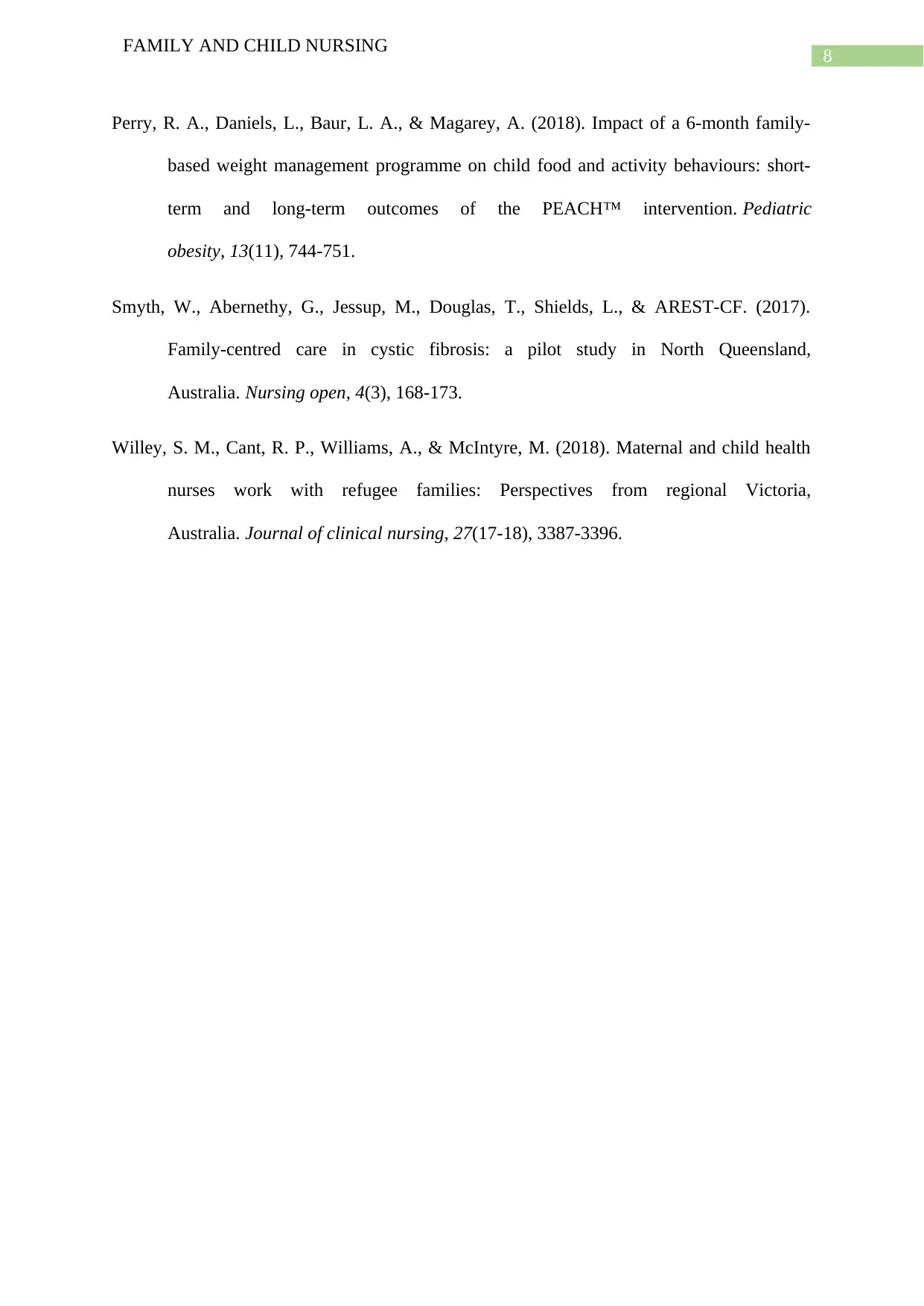
8
FAMILY AND CHILD NURSING
Perry, R. A., Daniels, L., Baur, L. A., & Magarey, A. (2018). Impact of a 6‐month family‐
based weight management programme on child food and activity behaviours: short‐
term and long‐term outcomes of the PEACH™ intervention. Pediatric
obesity, 13(11), 744-751.
Smyth, W., Abernethy, G., Jessup, M., Douglas, T., Shields, L., & AREST‐CF. (2017).
Family‐centred care in cystic fibrosis: a pilot study in North Queensland,
Australia. Nursing open, 4(3), 168-173.
Willey, S. M., Cant, R. P., Williams, A., & McIntyre, M. (2018). Maternal and child health
nurses work with refugee families: Perspectives from regional Victoria,
Australia. Journal of clinical nursing, 27(17-18), 3387-3396.
FAMILY AND CHILD NURSING
Perry, R. A., Daniels, L., Baur, L. A., & Magarey, A. (2018). Impact of a 6‐month family‐
based weight management programme on child food and activity behaviours: short‐
term and long‐term outcomes of the PEACH™ intervention. Pediatric
obesity, 13(11), 744-751.
Smyth, W., Abernethy, G., Jessup, M., Douglas, T., Shields, L., & AREST‐CF. (2017).
Family‐centred care in cystic fibrosis: a pilot study in North Queensland,
Australia. Nursing open, 4(3), 168-173.
Willey, S. M., Cant, R. P., Williams, A., & McIntyre, M. (2018). Maternal and child health
nurses work with refugee families: Perspectives from regional Victoria,
Australia. Journal of clinical nursing, 27(17-18), 3387-3396.
⊘ This is a preview!⊘
Do you want full access?
Subscribe today to unlock all pages.

Trusted by 1+ million students worldwide
1 out of 9
Related Documents
Your All-in-One AI-Powered Toolkit for Academic Success.
+13062052269
info@desklib.com
Available 24*7 on WhatsApp / Email
![[object Object]](/_next/static/media/star-bottom.7253800d.svg)
Unlock your academic potential
Copyright © 2020–2026 A2Z Services. All Rights Reserved. Developed and managed by ZUCOL.





